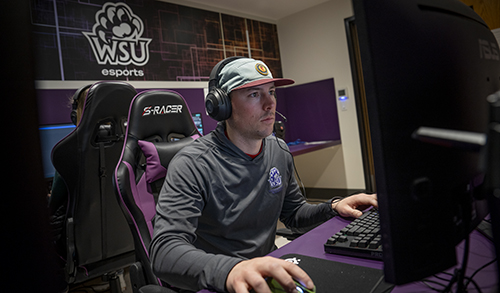Weber State’s new esports lab combines academics, extracurriculars
OGDEN, Utah — Weber State University students and faculty can now study the physiological effects video games have on the human body in a new esports lab on campus.
The esports lab is part of the newly renovated Human Performance Lab in the Department of Exercise & Nutrition Sciences. The Human Performance Lab provides hands-on learning experiences for exercise and sports science students, giving them opportunities to conduct fitness testing and research using state-of-the-art equipment. 
“The new esports lab helps us investigate the impact of gaming on different body processes. This is a new and exciting area of exercise science,” said Kristin Hadley, dean of the Jerry & Vickie Moyes College of Education.
Playing video games might not be the first activity that comes to mind when one imagines fitness and performance tests, but with the rising interest in esports and popularity of gaming worldwide, it’s an increasingly important area to study, said Bryan Dowdell, assistant professor of exercise and sport science.
“Video games are the most common entertainment media now,” Dowdell said. “Gamers are an unstudied population and the vast chunk of the population do play video games.”
The esports lab is Dowdell’s brainchild, a place to combine academic study and extracurricular activities. For his dissertation, Dowdell studied the difference in cardiovascular stress response between people who identified as gamers and non-gamers, finding that gamers had significant increases in heart rate and blood pressure, especially during competitive events.
“We need to delve deeper into what that actually means health-wise,” Dowdell said. “People who are gaming on PCs and consoles are sedentary for sometimes hours on end, and while their heart rate and blood pressure may be elevated, there is virtually no metabolic demand. Is this a good thing?”
The lab has six computers that are primarily utilized by Weber State’s esports junior varsity team for practice and during scrimmages, while Dowdell gathers data for research studies. Weber State has 21 scholarship students on the varsity teams, with around 50 students participating in the club altogether.
“Most universities have one lab exclusively for varsity players. We are lucky enough to have three, which is a huge step in the right direction for college esports in general,” said Tyler Oelling, WSU’s esports coordinator. “It’s important for teams to be able to practice separately to avoid noise issues and get the most out of their time.”
With the lab’s opening this spring, Dowdell has started research focused on cognitive skills and multitasking abilities in gamer and non-gamer college students. Any college student interested in participating in the study can email Dowdell at bryandowdell@weber.edu.
Jessica Kokesh, Marketing & Communications
801-626-7316, jessicakokesh@weber.edu- Contact:
Bryan Magaña, public relations director
801-626-7948, bryanmagana@weber.edu